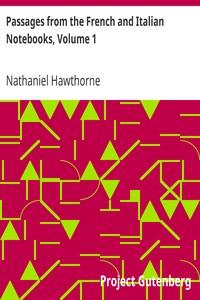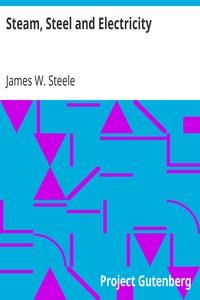Read this ebook for free! No credit card needed, absolutely nothing to pay.
Words: 51109 in 9 pages
This is an ebook sharing website. You can read the uploaded ebooks for free here. No credit cards needed, nothing to pay. If you want to own a digital copy of the ebook, or want to read offline with your favorite ebook-reader, then you can choose to buy and download the ebook.
THE STORY OF STEAM.
What Steam is.--Steam in Nature.--The Engine in its earlier forms.--Gradual explosion.--The Hero engine.--The Temple-door machine.--Ideas of the Middle Ages.--Beginnings of the modern engine.--Branca's engine.--Savery's engine.--The Papin engine using cylinder and piston.--Watt's improvements upon the Newcomen idea.--The crank movement.--The first use of steam expansively.--The "Governor."--First engine by an American Inventor.--Its effect upon progress in the United States.--Simplicity and cheapness of the modern engine.--Actual construction of the modern engine.--Valves, piston, etc., with diagrams.
THE AGE OF STEEL.
The various "Ages" in civilization.--Ancient knowledge of the metals.--The invention and use of Bronze.--What Steel is.--The "Lost Arts."--Metallurgy and chemistry.--Oriental Steel.--Modern definition of Steel.--Invention of Cast Steel.--First iron-ore discoveries in America.--First American Iron-works.--Early methods without steam.--First American casting.--Effect of iron industry upon independence.--Water-power.--The trip-hammer.--The steam-hammer of Nasmyth.--Machine-tools and their effects.--First rolling-mill.--Product of the iron industry in 1840-50.--The modern nail, and how it came.--Effect of iron upon architecture.--The "Sky-Scraper."--Gas as fuel in iron manufactures.--The Steel of the present.--The invention of Kelley.--The Bessemer process.--The "Converter."--Present product of Steel.--The Steel-mill.
THE STORY OF ELECTRICITY.
The oldest and the youngest of the sciences.--Origin of the name.--Ancient ideas of Electricity.--Later experiments.--Crude notions and wrong conclusions.--First Electric Machine.--Frictional Electricity.--The Leyden Jar.--Extreme ideas and Fakerism.--Franklin, his new ideas and their reception.--Franklin's Kite.--The Man Franklin.--Experiments after Franklin, leading to our present modern uses.--Galvani and his discovery.--Volta, and the first "Battery."--How a battery acts.--The laws of Electricity, and how they were discovered.--Induction, and its discoverer.--The line at which modern Electricity begins.--Magnetism and Electricity.--The Electro-Magnet.--The Molecular theory.--Faraday, and his Law of Magnetic Force.
MODERN ELECTRICITY.
THE STORY OF STEAM
That which was utterly unknown to the most splendid civilizations of the past is in our time the chief power of civilization, daily engaged in making that history of a new era that is yet to be written in words. It has been demonstrated long since that men's lives are to be influenced not by theory, or belief, or argument and reason, so much as by that course of daily life which is not attempted to be governed by argument and reason, but by great physical facts like steam, electricity and machinery in their present applications.
The greatest of these facts of the present civilization are expressed in the phrase, Steam and Steel. The theme is stupendous. Only the most prominent of its facts can be given in small space, and those only in outline. The subject is also old, yet to every boy it must be told again, and the most ordinary intelligence must have some desire to know the secrets, if such they are, of that which is unquestionably the greatest force that ever yielded to the audacity of humanity. It is now of little avail to know that all the records that men revere, all the great epics of the world, were written in the absence of the characteristic forces of modern life. A thousand generations had lived and died, an immense volume of history had been enacted, the heroes of all the ages, and almost those of our own time, had fulfilled their destinies and passed away, before it came about that a mere physical fact should fill a larger place in our lives than all examples, and that the evanescent vapor which we call steam should change daily, and effectively, the courses and modes of human action, and erect life upon another plane.
It may seem not a little absurd to inquire now "what is steam?" Everybody knows the answer. The non-technical reader knows that it is that vapor which, for instance, pervades the kitchen, which issues from every cooking vessel and waste-pipe, and is always white and visible, and moist and warm. We may best understand an answer to the question, perhaps, by remembering that steam is one of the three natural conditions of water: ice, fluid water, and steam. One or the other of these conditions always exists, and always under two others: pressure and heat. When the air around water reaches the temperature of thirty-two degrees by the scale of Fahrenheit, or ? or zero by the Centigrade scale, and is exposed to this temperature for a time, it becomes ice. At two hundred and twelve degrees Fahrenheit it becomes steam. Between these two temperatures it is water. But the change to steam which is so rapid and visible at the temperature above mentioned is taking place slowly all the time when water, in any situation, is exposed to the air. As the temperature rises the change becomes more rapid. The steam-making of the arts is merely that of all nature, hastened artificially and intentionally.
The element of pressure, mentioned above, enters into the proposition because water boils at a lower temperature, with less heat, when the weight of the atmosphere is less than normal, as it is at great elevations, and on days when, as we now express it, there is a low barometer. Long before any cook could explain the fact it was known that the water boiling quickly was a sign of storm. It has often been found by camping-parties on mountains that in an attempt to boil potatoes in a pot the water would all "boil away," and leave the vegetables uncooked. The heat required to evaporate it at the elevation was less than that required to cook in boiling water. It is one of the instances where the problems of nature intrude themselves prominently into the affairs of common life without previous notice.
Free books android app tbrJar TBR JAR Read Free books online gutenberg
More posts by @FreeBooks

: Passages from the French and Italian Notebooks Volume 1. by Hawthorne Nathaniel - Italy Description and travel; France Description and travel; Hawthorne Nathaniel 1804-1864 Diaries; Hawthorne Nathaniel 1804-1864 Travel France; Hawthorne Nathaniel 1804-1864


: Passages from the English Notebooks Complete by Hawthorne Nathaniel - England Description and travel; England Intellectual life 19th century; Hawthorne Nathaniel 1804-1864 Homes and haunts England; Americans England History 19th century; Hawthorne Nathanie






